Business Ethics Case Analysis: Ethical Solutions and Dilemmas
VerifiedAdded on 2020/05/28
|11
|2489
|653
Report
AI Summary
This report presents an analysis of five case studies focusing on various business ethics dilemmas. The cases cover diverse topics, including child labor in toy production, insider trading, the ethical implications of social media in hiring, the integrity of organic food labeling, and responsible sourcing in the Uzbek cotton industry. Each case includes a description of the ethical dilemma, followed by an exploration of alternative courses of action guided by different ethical theories such as consequentialism, deontological ethics, and virtue ethics. The report concludes by emphasizing the pervasive influence of ethics on all aspects of business decision-making and the importance of building a reputation of trustworthiness through ethical conduct. The report uses a variety of sources to support its arguments, including academic texts, online resources, and news articles.
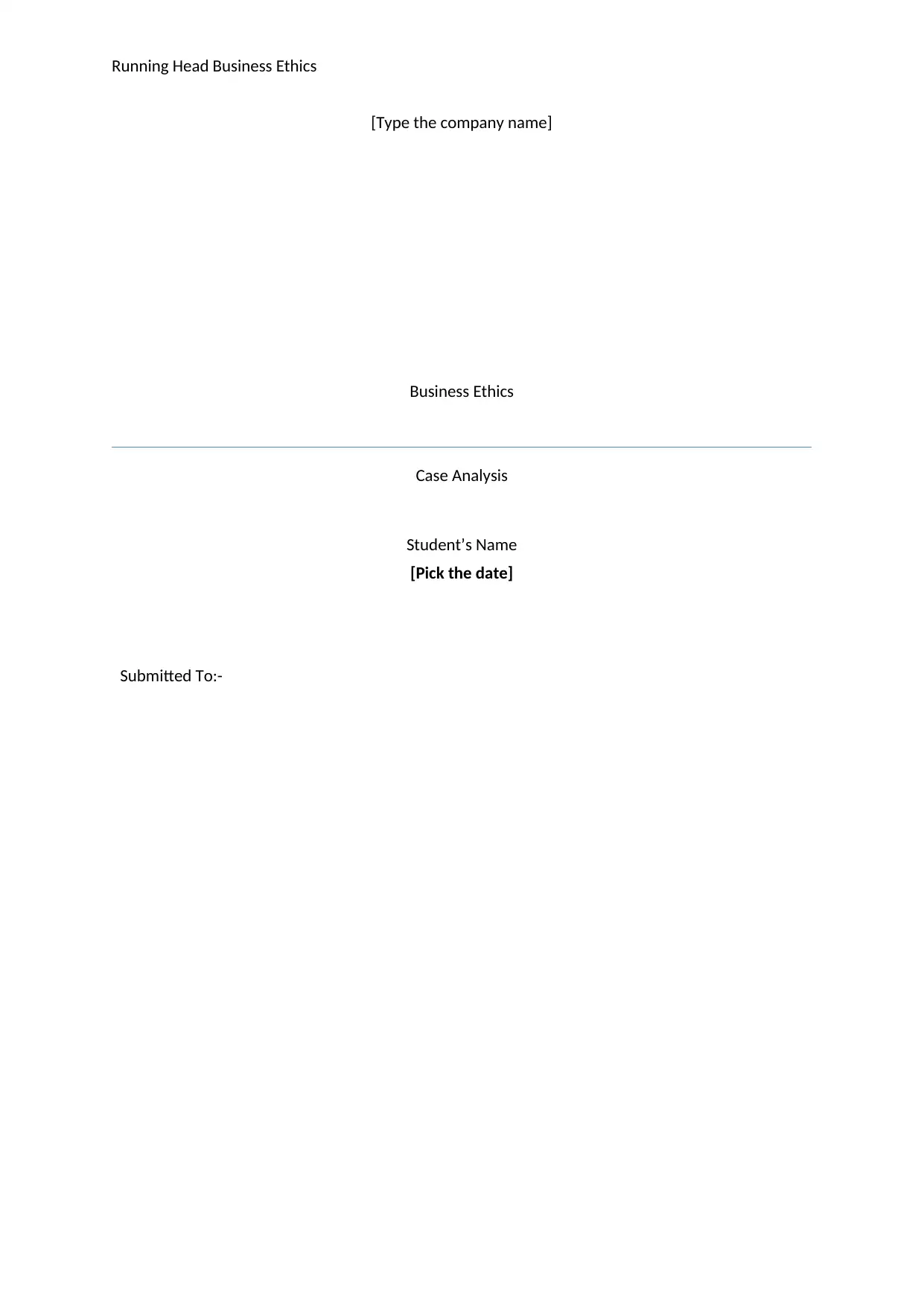
Running Head Business Ethics
[Type the company name]
Business Ethics
Case Analysis
Student’s Name
[Pick the date]
Submitted To:-
[Type the company name]
Business Ethics
Case Analysis
Student’s Name
[Pick the date]
Submitted To:-
Paraphrase This Document
Need a fresh take? Get an instant paraphrase of this document with our AI Paraphraser
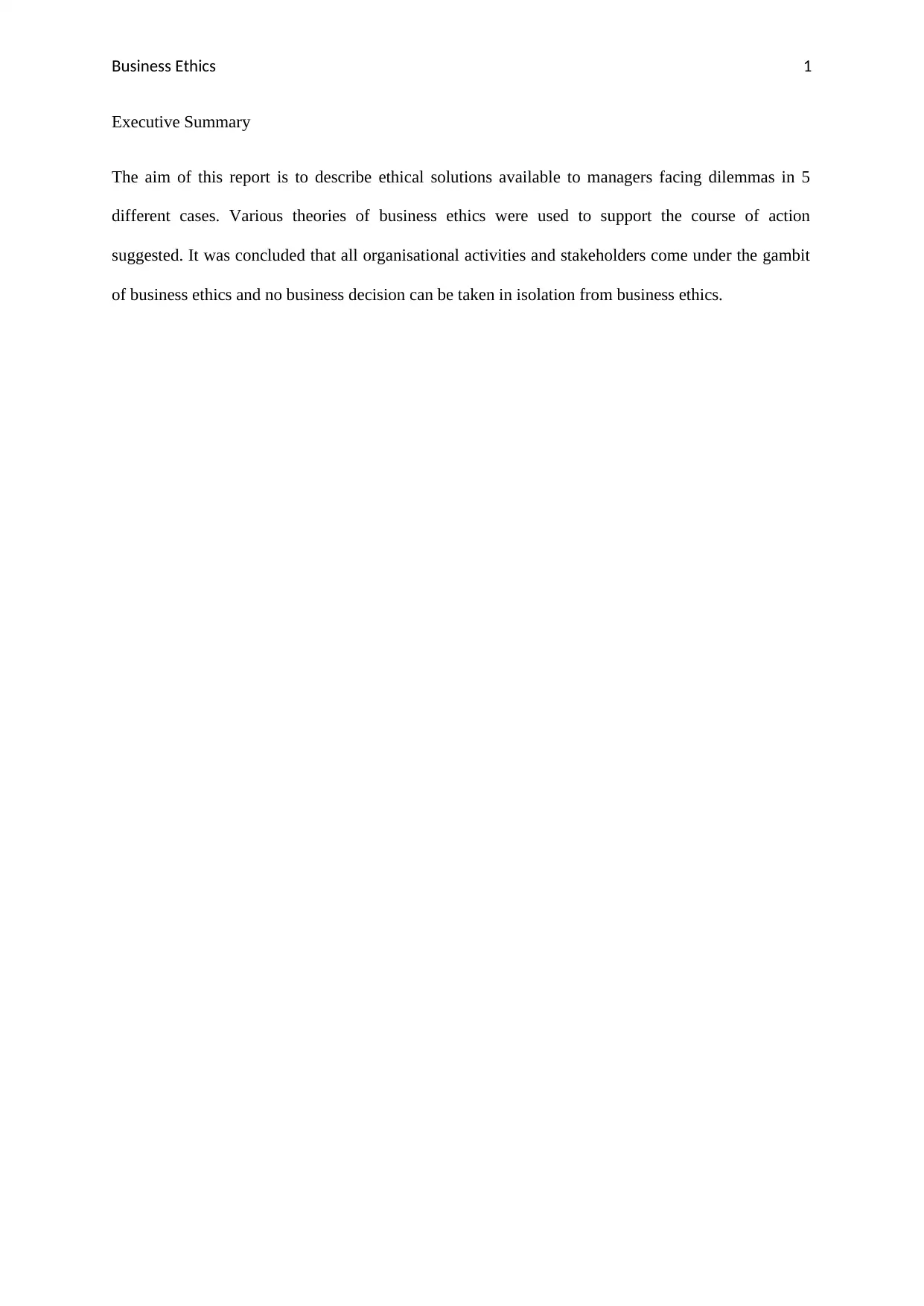
Business Ethics 1
Executive Summary
The aim of this report is to describe ethical solutions available to managers facing dilemmas in 5
different cases. Various theories of business ethics were used to support the course of action
suggested. It was concluded that all organisational activities and stakeholders come under the gambit
of business ethics and no business decision can be taken in isolation from business ethics.
Executive Summary
The aim of this report is to describe ethical solutions available to managers facing dilemmas in 5
different cases. Various theories of business ethics were used to support the course of action
suggested. It was concluded that all organisational activities and stakeholders come under the gambit
of business ethics and no business decision can be taken in isolation from business ethics.
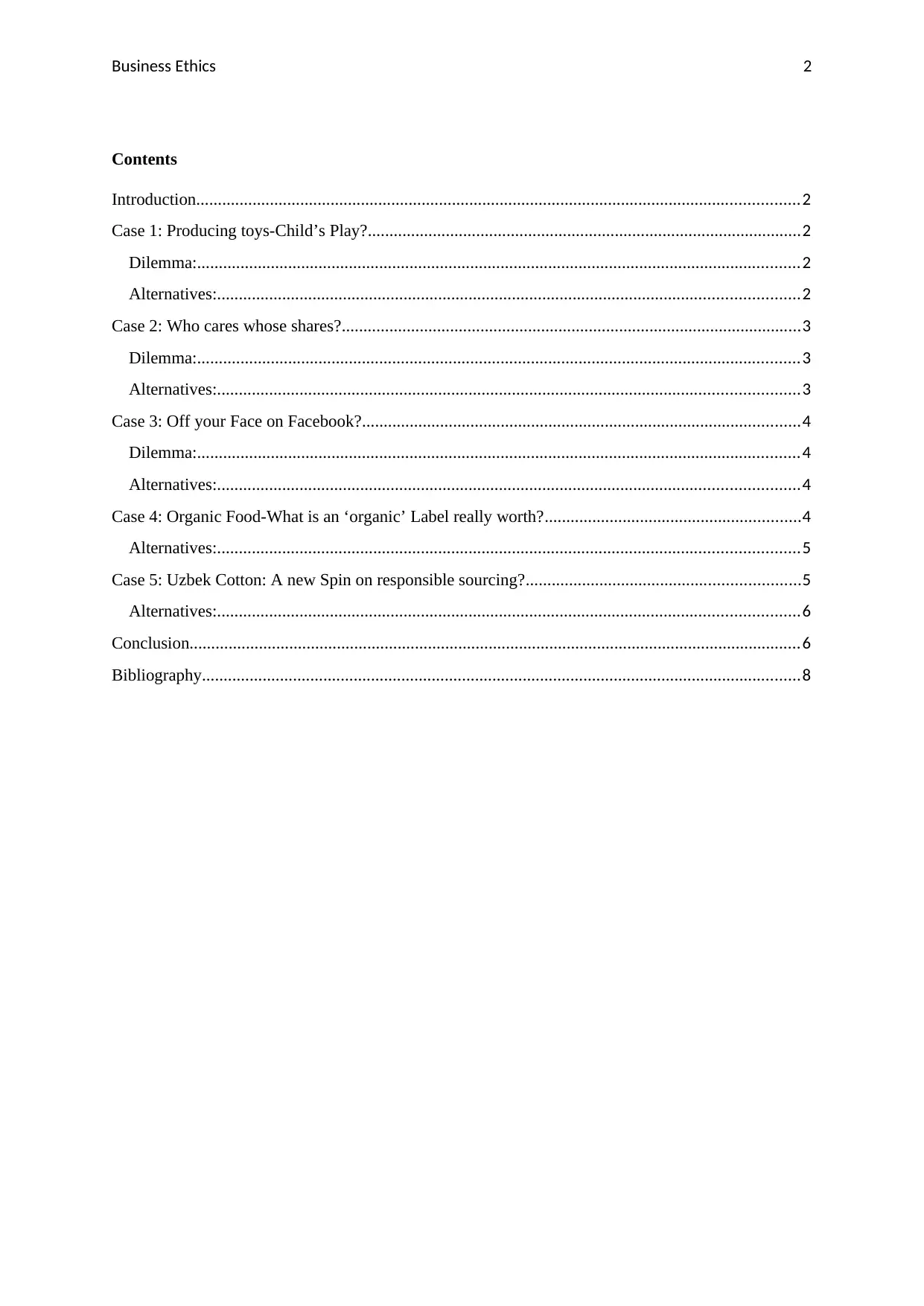
Business Ethics 2
Contents
Introduction...........................................................................................................................................2
Case 1: Producing toys-Child’s Play?....................................................................................................2
Dilemma:...........................................................................................................................................2
Alternatives:......................................................................................................................................2
Case 2: Who cares whose shares?..........................................................................................................3
Dilemma:...........................................................................................................................................3
Alternatives:......................................................................................................................................3
Case 3: Off your Face on Facebook?.....................................................................................................4
Dilemma:...........................................................................................................................................4
Alternatives:......................................................................................................................................4
Case 4: Organic Food-What is an ‘organic’ Label really worth?...........................................................4
Alternatives:......................................................................................................................................5
Case 5: Uzbek Cotton: A new Spin on responsible sourcing?...............................................................5
Alternatives:......................................................................................................................................6
Conclusion.............................................................................................................................................6
Bibliography..........................................................................................................................................8
Contents
Introduction...........................................................................................................................................2
Case 1: Producing toys-Child’s Play?....................................................................................................2
Dilemma:...........................................................................................................................................2
Alternatives:......................................................................................................................................2
Case 2: Who cares whose shares?..........................................................................................................3
Dilemma:...........................................................................................................................................3
Alternatives:......................................................................................................................................3
Case 3: Off your Face on Facebook?.....................................................................................................4
Dilemma:...........................................................................................................................................4
Alternatives:......................................................................................................................................4
Case 4: Organic Food-What is an ‘organic’ Label really worth?...........................................................4
Alternatives:......................................................................................................................................5
Case 5: Uzbek Cotton: A new Spin on responsible sourcing?...............................................................5
Alternatives:......................................................................................................................................6
Conclusion.............................................................................................................................................6
Bibliography..........................................................................................................................................8
⊘ This is a preview!⊘
Do you want full access?
Subscribe today to unlock all pages.

Trusted by 1+ million students worldwide
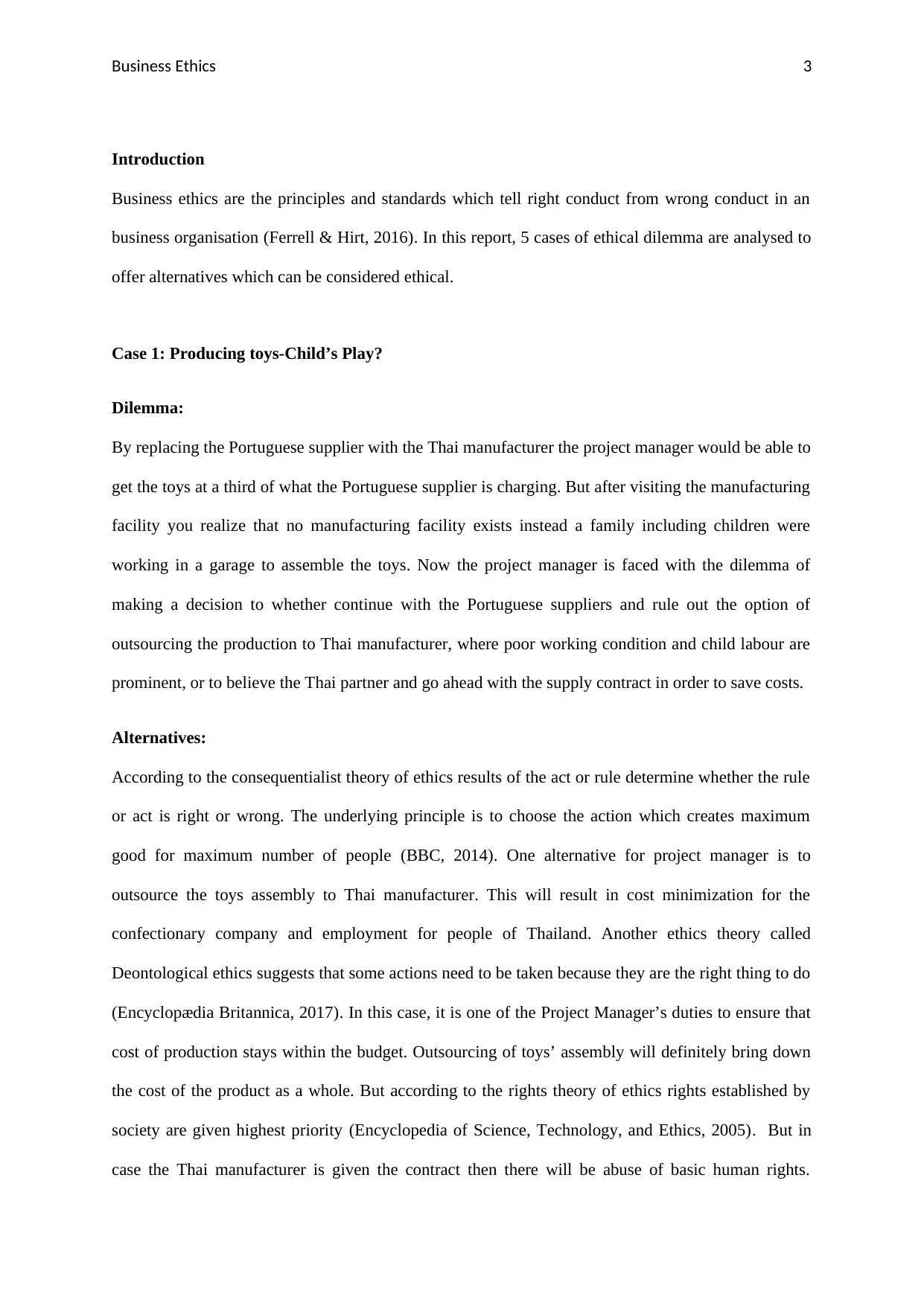
Business Ethics 3
Introduction
Business ethics are the principles and standards which tell right conduct from wrong conduct in an
business organisation (Ferrell & Hirt, 2016). In this report, 5 cases of ethical dilemma are analysed to
offer alternatives which can be considered ethical.
Case 1: Producing toys-Child’s Play?
Dilemma:
By replacing the Portuguese supplier with the Thai manufacturer the project manager would be able to
get the toys at a third of what the Portuguese supplier is charging. But after visiting the manufacturing
facility you realize that no manufacturing facility exists instead a family including children were
working in a garage to assemble the toys. Now the project manager is faced with the dilemma of
making a decision to whether continue with the Portuguese suppliers and rule out the option of
outsourcing the production to Thai manufacturer, where poor working condition and child labour are
prominent, or to believe the Thai partner and go ahead with the supply contract in order to save costs.
Alternatives:
According to the consequentialist theory of ethics results of the act or rule determine whether the rule
or act is right or wrong. The underlying principle is to choose the action which creates maximum
good for maximum number of people (BBC, 2014). One alternative for project manager is to
outsource the toys assembly to Thai manufacturer. This will result in cost minimization for the
confectionary company and employment for people of Thailand. Another ethics theory called
Deontological ethics suggests that some actions need to be taken because they are the right thing to do
(Encyclopædia Britannica, 2017). In this case, it is one of the Project Manager’s duties to ensure that
cost of production stays within the budget. Outsourcing of toys’ assembly will definitely bring down
the cost of the product as a whole. But according to the rights theory of ethics rights established by
society are given highest priority (Encyclopedia of Science, Technology, and Ethics, 2005). But in
case the Thai manufacturer is given the contract then there will be abuse of basic human rights.
Introduction
Business ethics are the principles and standards which tell right conduct from wrong conduct in an
business organisation (Ferrell & Hirt, 2016). In this report, 5 cases of ethical dilemma are analysed to
offer alternatives which can be considered ethical.
Case 1: Producing toys-Child’s Play?
Dilemma:
By replacing the Portuguese supplier with the Thai manufacturer the project manager would be able to
get the toys at a third of what the Portuguese supplier is charging. But after visiting the manufacturing
facility you realize that no manufacturing facility exists instead a family including children were
working in a garage to assemble the toys. Now the project manager is faced with the dilemma of
making a decision to whether continue with the Portuguese suppliers and rule out the option of
outsourcing the production to Thai manufacturer, where poor working condition and child labour are
prominent, or to believe the Thai partner and go ahead with the supply contract in order to save costs.
Alternatives:
According to the consequentialist theory of ethics results of the act or rule determine whether the rule
or act is right or wrong. The underlying principle is to choose the action which creates maximum
good for maximum number of people (BBC, 2014). One alternative for project manager is to
outsource the toys assembly to Thai manufacturer. This will result in cost minimization for the
confectionary company and employment for people of Thailand. Another ethics theory called
Deontological ethics suggests that some actions need to be taken because they are the right thing to do
(Encyclopædia Britannica, 2017). In this case, it is one of the Project Manager’s duties to ensure that
cost of production stays within the budget. Outsourcing of toys’ assembly will definitely bring down
the cost of the product as a whole. But according to the rights theory of ethics rights established by
society are given highest priority (Encyclopedia of Science, Technology, and Ethics, 2005). But in
case the Thai manufacturer is given the contract then there will be abuse of basic human rights.
Paraphrase This Document
Need a fresh take? Get an instant paraphrase of this document with our AI Paraphraser
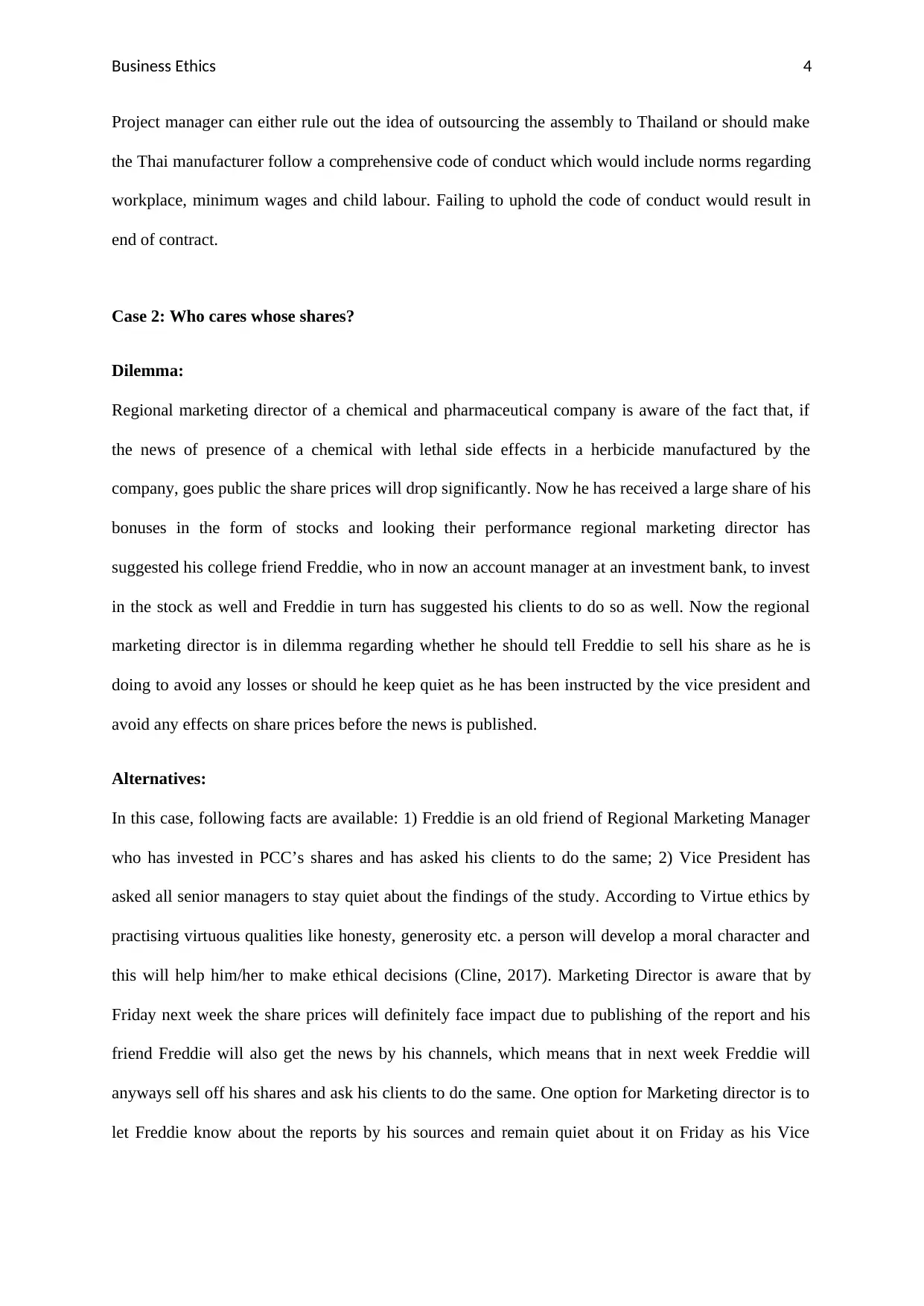
Business Ethics 4
Project manager can either rule out the idea of outsourcing the assembly to Thailand or should make
the Thai manufacturer follow a comprehensive code of conduct which would include norms regarding
workplace, minimum wages and child labour. Failing to uphold the code of conduct would result in
end of contract.
Case 2: Who cares whose shares?
Dilemma:
Regional marketing director of a chemical and pharmaceutical company is aware of the fact that, if
the news of presence of a chemical with lethal side effects in a herbicide manufactured by the
company, goes public the share prices will drop significantly. Now he has received a large share of his
bonuses in the form of stocks and looking their performance regional marketing director has
suggested his college friend Freddie, who in now an account manager at an investment bank, to invest
in the stock as well and Freddie in turn has suggested his clients to do so as well. Now the regional
marketing director is in dilemma regarding whether he should tell Freddie to sell his share as he is
doing to avoid any losses or should he keep quiet as he has been instructed by the vice president and
avoid any effects on share prices before the news is published.
Alternatives:
In this case, following facts are available: 1) Freddie is an old friend of Regional Marketing Manager
who has invested in PCC’s shares and has asked his clients to do the same; 2) Vice President has
asked all senior managers to stay quiet about the findings of the study. According to Virtue ethics by
practising virtuous qualities like honesty, generosity etc. a person will develop a moral character and
this will help him/her to make ethical decisions (Cline, 2017). Marketing Director is aware that by
Friday next week the share prices will definitely face impact due to publishing of the report and his
friend Freddie will also get the news by his channels, which means that in next week Freddie will
anyways sell off his shares and ask his clients to do the same. One option for Marketing director is to
let Freddie know about the reports by his sources and remain quiet about it on Friday as his Vice
Project manager can either rule out the idea of outsourcing the assembly to Thailand or should make
the Thai manufacturer follow a comprehensive code of conduct which would include norms regarding
workplace, minimum wages and child labour. Failing to uphold the code of conduct would result in
end of contract.
Case 2: Who cares whose shares?
Dilemma:
Regional marketing director of a chemical and pharmaceutical company is aware of the fact that, if
the news of presence of a chemical with lethal side effects in a herbicide manufactured by the
company, goes public the share prices will drop significantly. Now he has received a large share of his
bonuses in the form of stocks and looking their performance regional marketing director has
suggested his college friend Freddie, who in now an account manager at an investment bank, to invest
in the stock as well and Freddie in turn has suggested his clients to do so as well. Now the regional
marketing director is in dilemma regarding whether he should tell Freddie to sell his share as he is
doing to avoid any losses or should he keep quiet as he has been instructed by the vice president and
avoid any effects on share prices before the news is published.
Alternatives:
In this case, following facts are available: 1) Freddie is an old friend of Regional Marketing Manager
who has invested in PCC’s shares and has asked his clients to do the same; 2) Vice President has
asked all senior managers to stay quiet about the findings of the study. According to Virtue ethics by
practising virtuous qualities like honesty, generosity etc. a person will develop a moral character and
this will help him/her to make ethical decisions (Cline, 2017). Marketing Director is aware that by
Friday next week the share prices will definitely face impact due to publishing of the report and his
friend Freddie will also get the news by his channels, which means that in next week Freddie will
anyways sell off his shares and ask his clients to do the same. One option for Marketing director is to
let Freddie know about the reports by his sources and remain quiet about it on Friday as his Vice
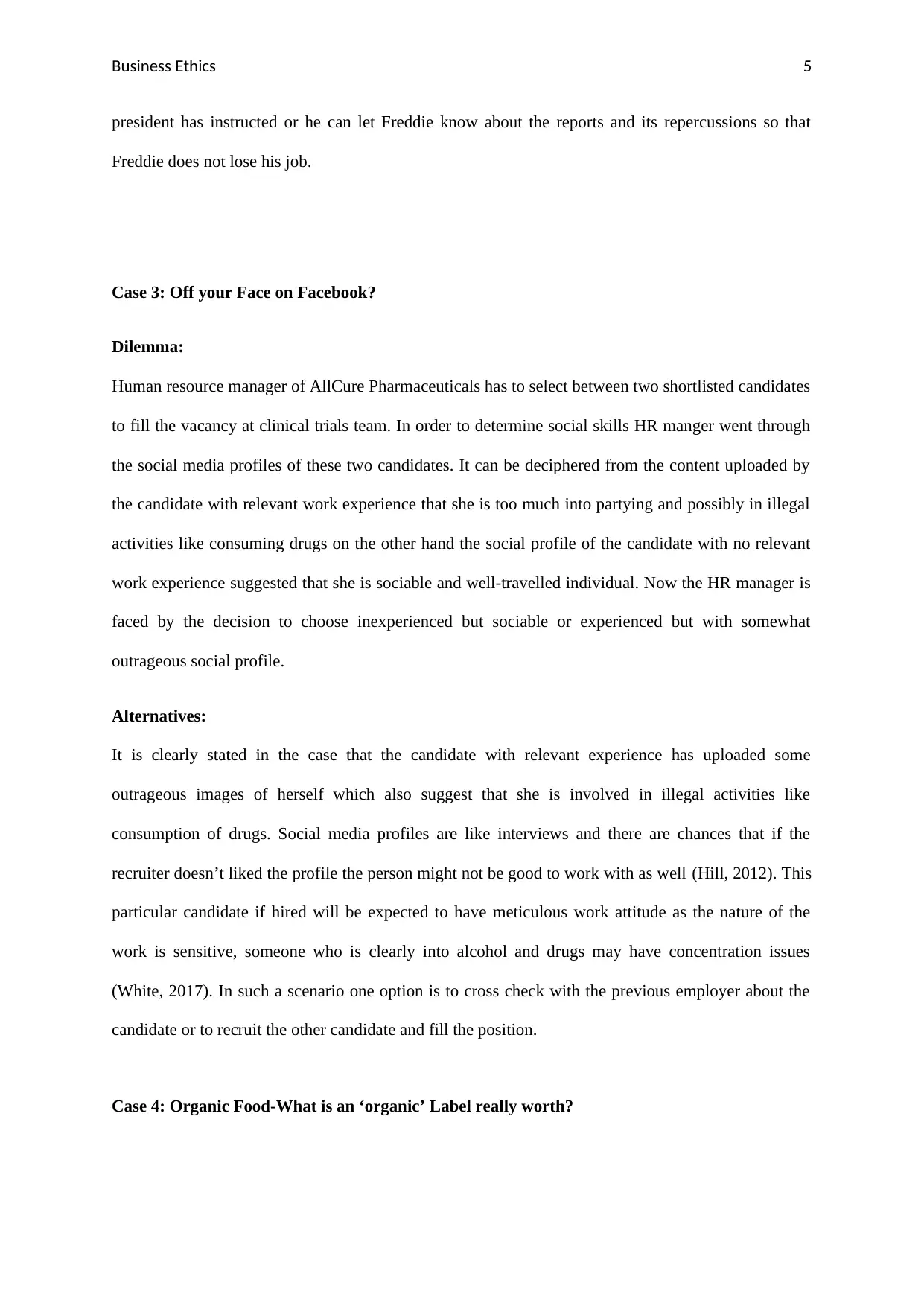
Business Ethics 5
president has instructed or he can let Freddie know about the reports and its repercussions so that
Freddie does not lose his job.
Case 3: Off your Face on Facebook?
Dilemma:
Human resource manager of AllCure Pharmaceuticals has to select between two shortlisted candidates
to fill the vacancy at clinical trials team. In order to determine social skills HR manger went through
the social media profiles of these two candidates. It can be deciphered from the content uploaded by
the candidate with relevant work experience that she is too much into partying and possibly in illegal
activities like consuming drugs on the other hand the social profile of the candidate with no relevant
work experience suggested that she is sociable and well-travelled individual. Now the HR manager is
faced by the decision to choose inexperienced but sociable or experienced but with somewhat
outrageous social profile.
Alternatives:
It is clearly stated in the case that the candidate with relevant experience has uploaded some
outrageous images of herself which also suggest that she is involved in illegal activities like
consumption of drugs. Social media profiles are like interviews and there are chances that if the
recruiter doesn’t liked the profile the person might not be good to work with as well (Hill, 2012). This
particular candidate if hired will be expected to have meticulous work attitude as the nature of the
work is sensitive, someone who is clearly into alcohol and drugs may have concentration issues
(White, 2017). In such a scenario one option is to cross check with the previous employer about the
candidate or to recruit the other candidate and fill the position.
Case 4: Organic Food-What is an ‘organic’ Label really worth?
president has instructed or he can let Freddie know about the reports and its repercussions so that
Freddie does not lose his job.
Case 3: Off your Face on Facebook?
Dilemma:
Human resource manager of AllCure Pharmaceuticals has to select between two shortlisted candidates
to fill the vacancy at clinical trials team. In order to determine social skills HR manger went through
the social media profiles of these two candidates. It can be deciphered from the content uploaded by
the candidate with relevant work experience that she is too much into partying and possibly in illegal
activities like consuming drugs on the other hand the social profile of the candidate with no relevant
work experience suggested that she is sociable and well-travelled individual. Now the HR manager is
faced by the decision to choose inexperienced but sociable or experienced but with somewhat
outrageous social profile.
Alternatives:
It is clearly stated in the case that the candidate with relevant experience has uploaded some
outrageous images of herself which also suggest that she is involved in illegal activities like
consumption of drugs. Social media profiles are like interviews and there are chances that if the
recruiter doesn’t liked the profile the person might not be good to work with as well (Hill, 2012). This
particular candidate if hired will be expected to have meticulous work attitude as the nature of the
work is sensitive, someone who is clearly into alcohol and drugs may have concentration issues
(White, 2017). In such a scenario one option is to cross check with the previous employer about the
candidate or to recruit the other candidate and fill the position.
Case 4: Organic Food-What is an ‘organic’ Label really worth?
⊘ This is a preview!⊘
Do you want full access?
Subscribe today to unlock all pages.

Trusted by 1+ million students worldwide
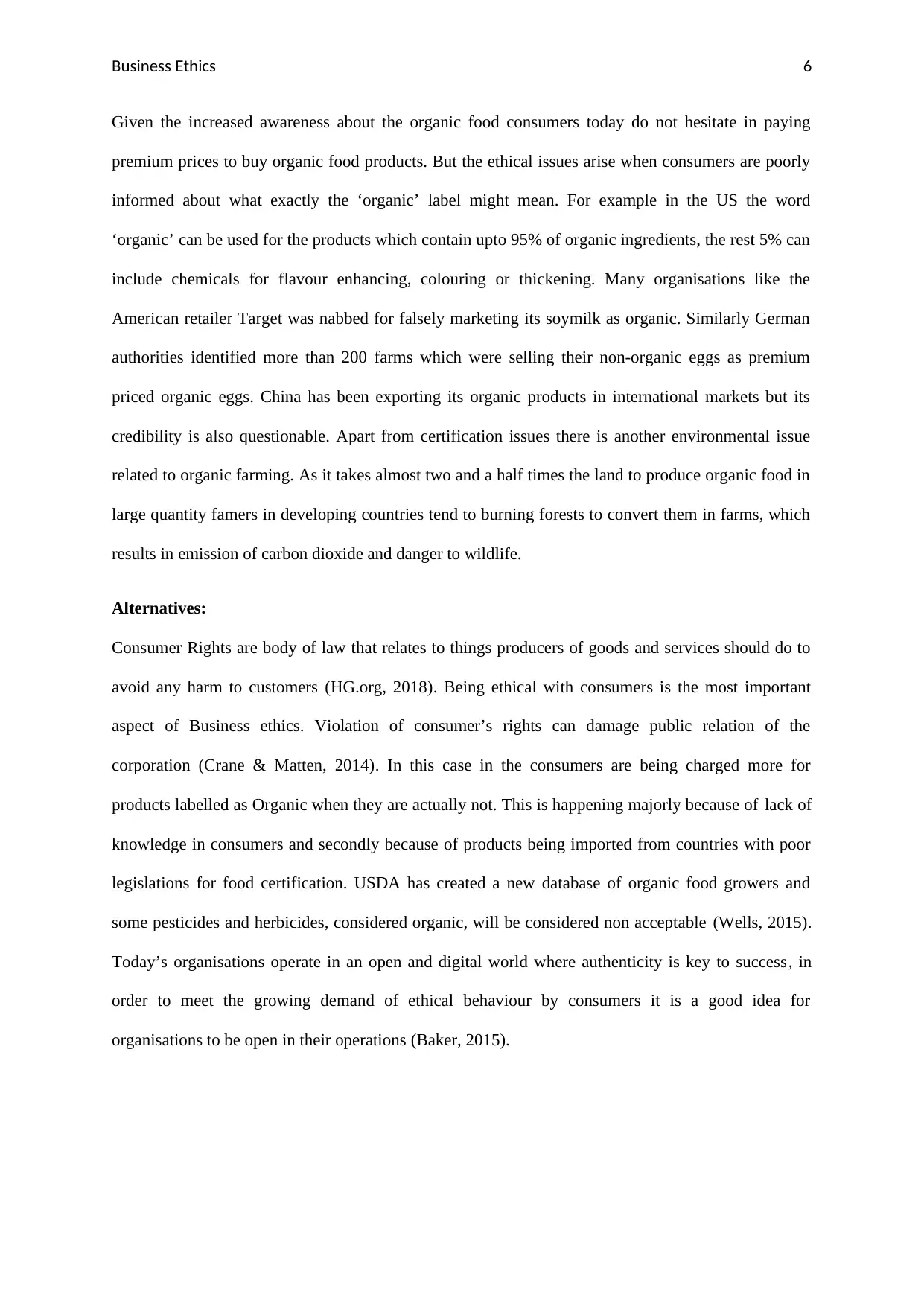
Business Ethics 6
Given the increased awareness about the organic food consumers today do not hesitate in paying
premium prices to buy organic food products. But the ethical issues arise when consumers are poorly
informed about what exactly the ‘organic’ label might mean. For example in the US the word
‘organic’ can be used for the products which contain upto 95% of organic ingredients, the rest 5% can
include chemicals for flavour enhancing, colouring or thickening. Many organisations like the
American retailer Target was nabbed for falsely marketing its soymilk as organic. Similarly German
authorities identified more than 200 farms which were selling their non-organic eggs as premium
priced organic eggs. China has been exporting its organic products in international markets but its
credibility is also questionable. Apart from certification issues there is another environmental issue
related to organic farming. As it takes almost two and a half times the land to produce organic food in
large quantity famers in developing countries tend to burning forests to convert them in farms, which
results in emission of carbon dioxide and danger to wildlife.
Alternatives:
Consumer Rights are body of law that relates to things producers of goods and services should do to
avoid any harm to customers (HG.org, 2018). Being ethical with consumers is the most important
aspect of Business ethics. Violation of consumer’s rights can damage public relation of the
corporation (Crane & Matten, 2014). In this case in the consumers are being charged more for
products labelled as Organic when they are actually not. This is happening majorly because of lack of
knowledge in consumers and secondly because of products being imported from countries with poor
legislations for food certification. USDA has created a new database of organic food growers and
some pesticides and herbicides, considered organic, will be considered non acceptable (Wells, 2015).
Today’s organisations operate in an open and digital world where authenticity is key to success, in
order to meet the growing demand of ethical behaviour by consumers it is a good idea for
organisations to be open in their operations (Baker, 2015).
Given the increased awareness about the organic food consumers today do not hesitate in paying
premium prices to buy organic food products. But the ethical issues arise when consumers are poorly
informed about what exactly the ‘organic’ label might mean. For example in the US the word
‘organic’ can be used for the products which contain upto 95% of organic ingredients, the rest 5% can
include chemicals for flavour enhancing, colouring or thickening. Many organisations like the
American retailer Target was nabbed for falsely marketing its soymilk as organic. Similarly German
authorities identified more than 200 farms which were selling their non-organic eggs as premium
priced organic eggs. China has been exporting its organic products in international markets but its
credibility is also questionable. Apart from certification issues there is another environmental issue
related to organic farming. As it takes almost two and a half times the land to produce organic food in
large quantity famers in developing countries tend to burning forests to convert them in farms, which
results in emission of carbon dioxide and danger to wildlife.
Alternatives:
Consumer Rights are body of law that relates to things producers of goods and services should do to
avoid any harm to customers (HG.org, 2018). Being ethical with consumers is the most important
aspect of Business ethics. Violation of consumer’s rights can damage public relation of the
corporation (Crane & Matten, 2014). In this case in the consumers are being charged more for
products labelled as Organic when they are actually not. This is happening majorly because of lack of
knowledge in consumers and secondly because of products being imported from countries with poor
legislations for food certification. USDA has created a new database of organic food growers and
some pesticides and herbicides, considered organic, will be considered non acceptable (Wells, 2015).
Today’s organisations operate in an open and digital world where authenticity is key to success, in
order to meet the growing demand of ethical behaviour by consumers it is a good idea for
organisations to be open in their operations (Baker, 2015).
Paraphrase This Document
Need a fresh take? Get an instant paraphrase of this document with our AI Paraphraser
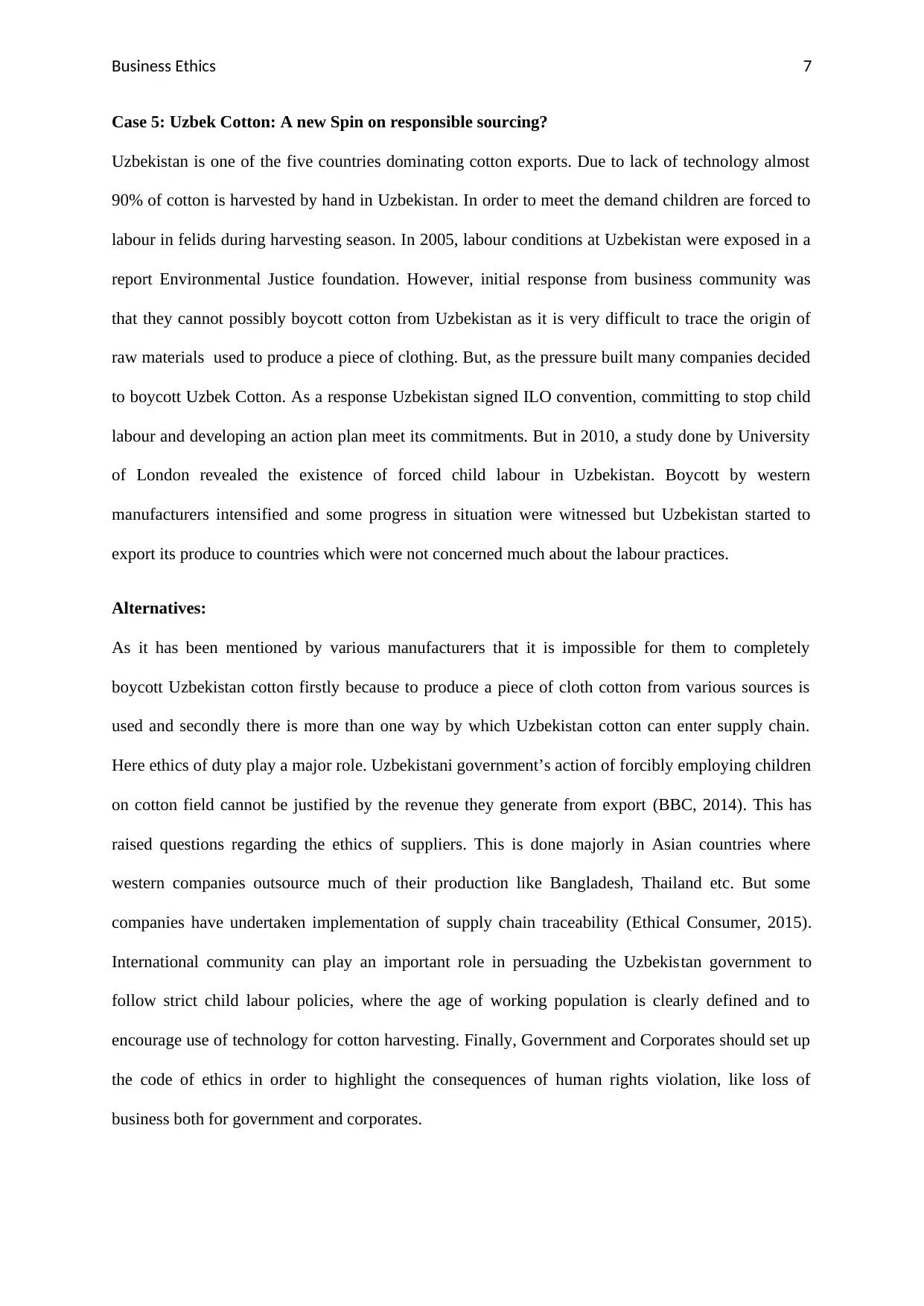
Business Ethics 7
Case 5: Uzbek Cotton: A new Spin on responsible sourcing?
Uzbekistan is one of the five countries dominating cotton exports. Due to lack of technology almost
90% of cotton is harvested by hand in Uzbekistan. In order to meet the demand children are forced to
labour in felids during harvesting season. In 2005, labour conditions at Uzbekistan were exposed in a
report Environmental Justice foundation. However, initial response from business community was
that they cannot possibly boycott cotton from Uzbekistan as it is very difficult to trace the origin of
raw materials used to produce a piece of clothing. But, as the pressure built many companies decided
to boycott Uzbek Cotton. As a response Uzbekistan signed ILO convention, committing to stop child
labour and developing an action plan meet its commitments. But in 2010, a study done by University
of London revealed the existence of forced child labour in Uzbekistan. Boycott by western
manufacturers intensified and some progress in situation were witnessed but Uzbekistan started to
export its produce to countries which were not concerned much about the labour practices.
Alternatives:
As it has been mentioned by various manufacturers that it is impossible for them to completely
boycott Uzbekistan cotton firstly because to produce a piece of cloth cotton from various sources is
used and secondly there is more than one way by which Uzbekistan cotton can enter supply chain.
Here ethics of duty play a major role. Uzbekistani government’s action of forcibly employing children
on cotton field cannot be justified by the revenue they generate from export (BBC, 2014). This has
raised questions regarding the ethics of suppliers. This is done majorly in Asian countries where
western companies outsource much of their production like Bangladesh, Thailand etc. But some
companies have undertaken implementation of supply chain traceability (Ethical Consumer, 2015).
International community can play an important role in persuading the Uzbekistan government to
follow strict child labour policies, where the age of working population is clearly defined and to
encourage use of technology for cotton harvesting. Finally, Government and Corporates should set up
the code of ethics in order to highlight the consequences of human rights violation, like loss of
business both for government and corporates.
Case 5: Uzbek Cotton: A new Spin on responsible sourcing?
Uzbekistan is one of the five countries dominating cotton exports. Due to lack of technology almost
90% of cotton is harvested by hand in Uzbekistan. In order to meet the demand children are forced to
labour in felids during harvesting season. In 2005, labour conditions at Uzbekistan were exposed in a
report Environmental Justice foundation. However, initial response from business community was
that they cannot possibly boycott cotton from Uzbekistan as it is very difficult to trace the origin of
raw materials used to produce a piece of clothing. But, as the pressure built many companies decided
to boycott Uzbek Cotton. As a response Uzbekistan signed ILO convention, committing to stop child
labour and developing an action plan meet its commitments. But in 2010, a study done by University
of London revealed the existence of forced child labour in Uzbekistan. Boycott by western
manufacturers intensified and some progress in situation were witnessed but Uzbekistan started to
export its produce to countries which were not concerned much about the labour practices.
Alternatives:
As it has been mentioned by various manufacturers that it is impossible for them to completely
boycott Uzbekistan cotton firstly because to produce a piece of cloth cotton from various sources is
used and secondly there is more than one way by which Uzbekistan cotton can enter supply chain.
Here ethics of duty play a major role. Uzbekistani government’s action of forcibly employing children
on cotton field cannot be justified by the revenue they generate from export (BBC, 2014). This has
raised questions regarding the ethics of suppliers. This is done majorly in Asian countries where
western companies outsource much of their production like Bangladesh, Thailand etc. But some
companies have undertaken implementation of supply chain traceability (Ethical Consumer, 2015).
International community can play an important role in persuading the Uzbekistan government to
follow strict child labour policies, where the age of working population is clearly defined and to
encourage use of technology for cotton harvesting. Finally, Government and Corporates should set up
the code of ethics in order to highlight the consequences of human rights violation, like loss of
business both for government and corporates.
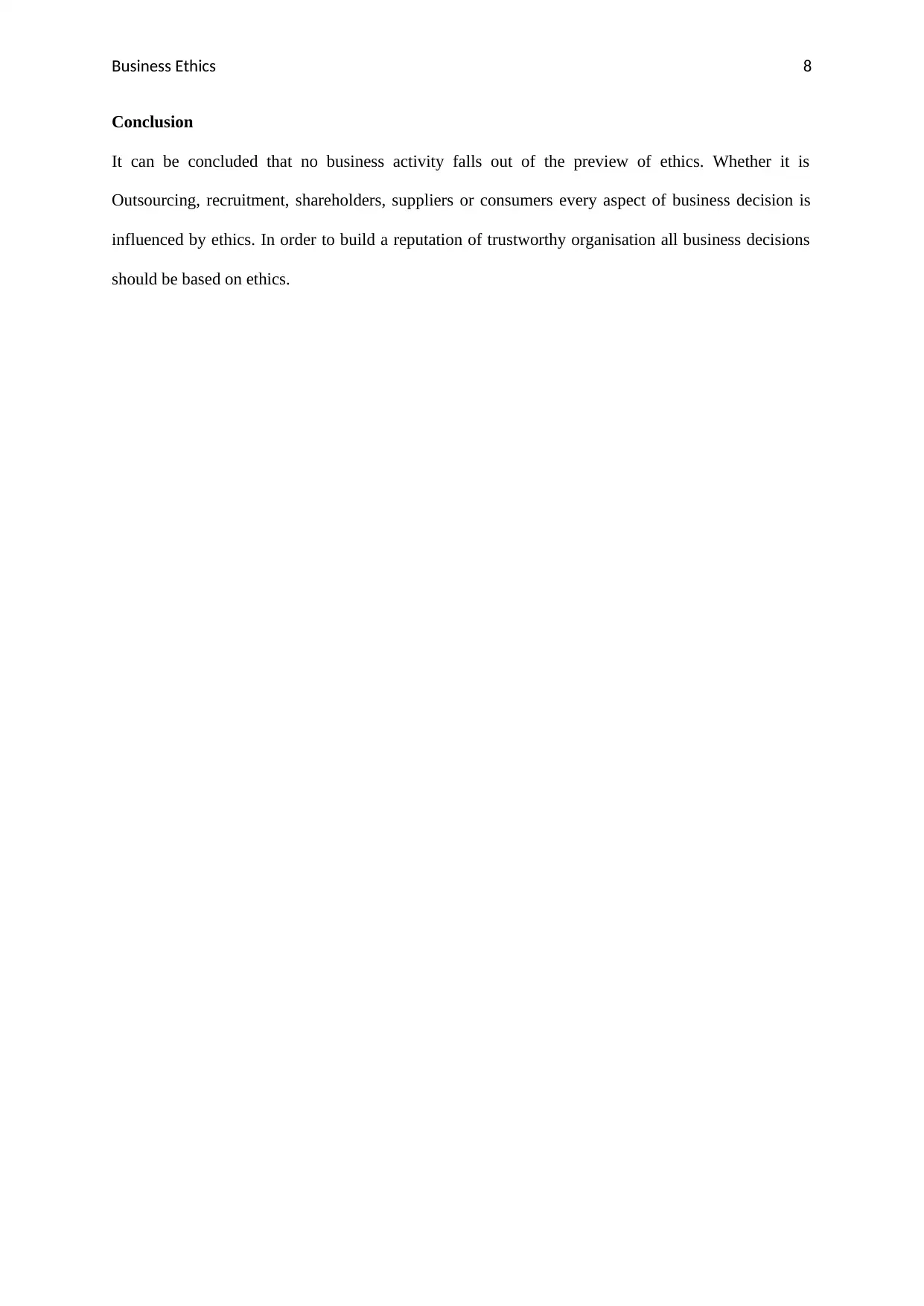
Business Ethics 8
Conclusion
It can be concluded that no business activity falls out of the preview of ethics. Whether it is
Outsourcing, recruitment, shareholders, suppliers or consumers every aspect of business decision is
influenced by ethics. In order to build a reputation of trustworthy organisation all business decisions
should be based on ethics.
Conclusion
It can be concluded that no business activity falls out of the preview of ethics. Whether it is
Outsourcing, recruitment, shareholders, suppliers or consumers every aspect of business decision is
influenced by ethics. In order to build a reputation of trustworthy organisation all business decisions
should be based on ethics.
⊘ This is a preview!⊘
Do you want full access?
Subscribe today to unlock all pages.

Trusted by 1+ million students worldwide
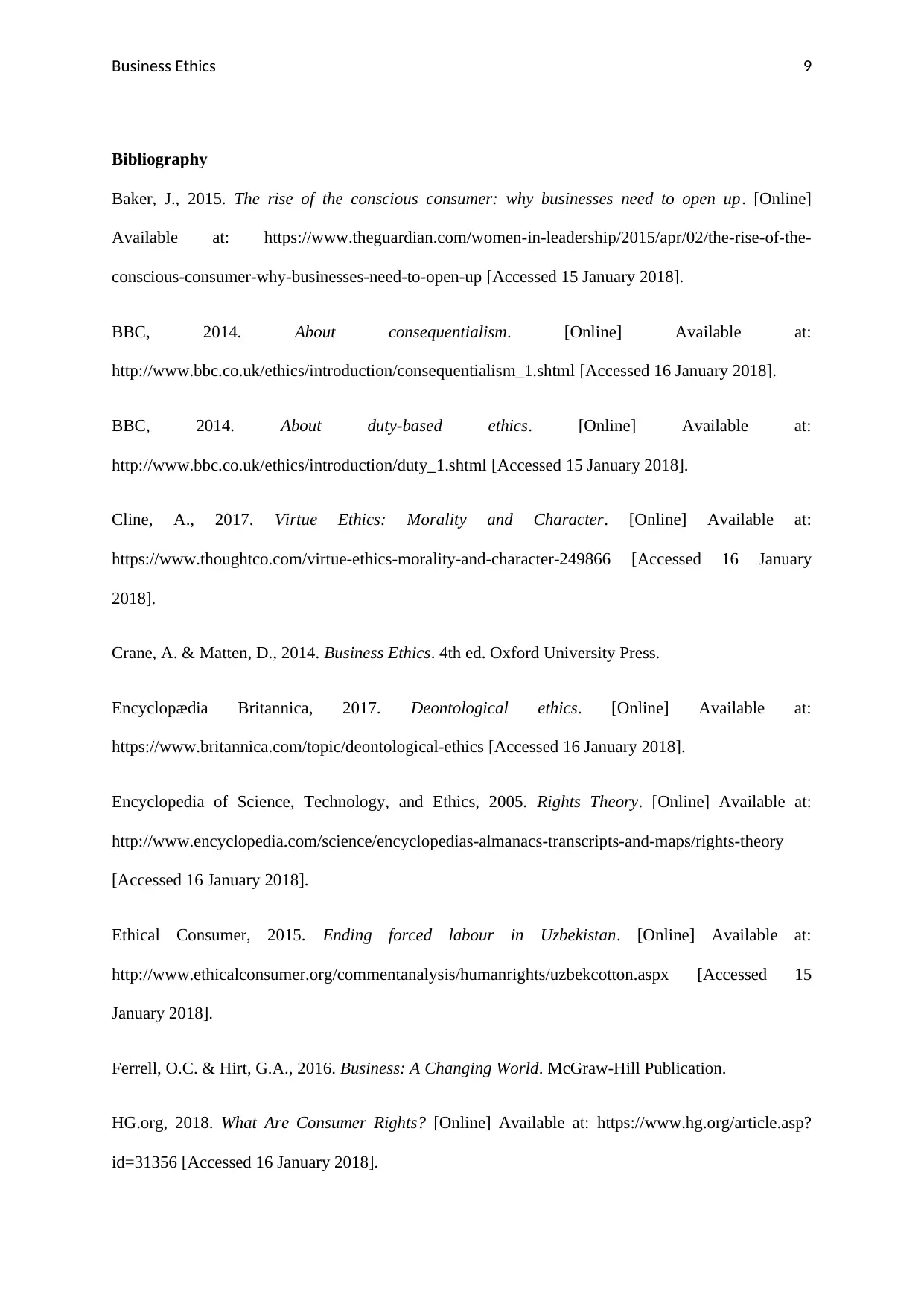
Business Ethics 9
Bibliography
Baker, J., 2015. The rise of the conscious consumer: why businesses need to open up. [Online]
Available at: https://www.theguardian.com/women-in-leadership/2015/apr/02/the-rise-of-the-
conscious-consumer-why-businesses-need-to-open-up [Accessed 15 January 2018].
BBC, 2014. About consequentialism. [Online] Available at:
http://www.bbc.co.uk/ethics/introduction/consequentialism_1.shtml [Accessed 16 January 2018].
BBC, 2014. About duty-based ethics. [Online] Available at:
http://www.bbc.co.uk/ethics/introduction/duty_1.shtml [Accessed 15 January 2018].
Cline, A., 2017. Virtue Ethics: Morality and Character. [Online] Available at:
https://www.thoughtco.com/virtue-ethics-morality-and-character-249866 [Accessed 16 January
2018].
Crane, A. & Matten, D., 2014. Business Ethics. 4th ed. Oxford University Press.
Encyclopædia Britannica, 2017. Deontological ethics. [Online] Available at:
https://www.britannica.com/topic/deontological-ethics [Accessed 16 January 2018].
Encyclopedia of Science, Technology, and Ethics, 2005. Rights Theory. [Online] Available at:
http://www.encyclopedia.com/science/encyclopedias-almanacs-transcripts-and-maps/rights-theory
[Accessed 16 January 2018].
Ethical Consumer, 2015. Ending forced labour in Uzbekistan. [Online] Available at:
http://www.ethicalconsumer.org/commentanalysis/humanrights/uzbekcotton.aspx [Accessed 15
January 2018].
Ferrell, O.C. & Hirt, G.A., 2016. Business: A Changing World. McGraw-Hill Publication.
HG.org, 2018. What Are Consumer Rights? [Online] Available at: https://www.hg.org/article.asp?
id=31356 [Accessed 16 January 2018].
Bibliography
Baker, J., 2015. The rise of the conscious consumer: why businesses need to open up. [Online]
Available at: https://www.theguardian.com/women-in-leadership/2015/apr/02/the-rise-of-the-
conscious-consumer-why-businesses-need-to-open-up [Accessed 15 January 2018].
BBC, 2014. About consequentialism. [Online] Available at:
http://www.bbc.co.uk/ethics/introduction/consequentialism_1.shtml [Accessed 16 January 2018].
BBC, 2014. About duty-based ethics. [Online] Available at:
http://www.bbc.co.uk/ethics/introduction/duty_1.shtml [Accessed 15 January 2018].
Cline, A., 2017. Virtue Ethics: Morality and Character. [Online] Available at:
https://www.thoughtco.com/virtue-ethics-morality-and-character-249866 [Accessed 16 January
2018].
Crane, A. & Matten, D., 2014. Business Ethics. 4th ed. Oxford University Press.
Encyclopædia Britannica, 2017. Deontological ethics. [Online] Available at:
https://www.britannica.com/topic/deontological-ethics [Accessed 16 January 2018].
Encyclopedia of Science, Technology, and Ethics, 2005. Rights Theory. [Online] Available at:
http://www.encyclopedia.com/science/encyclopedias-almanacs-transcripts-and-maps/rights-theory
[Accessed 16 January 2018].
Ethical Consumer, 2015. Ending forced labour in Uzbekistan. [Online] Available at:
http://www.ethicalconsumer.org/commentanalysis/humanrights/uzbekcotton.aspx [Accessed 15
January 2018].
Ferrell, O.C. & Hirt, G.A., 2016. Business: A Changing World. McGraw-Hill Publication.
HG.org, 2018. What Are Consumer Rights? [Online] Available at: https://www.hg.org/article.asp?
id=31356 [Accessed 16 January 2018].
Paraphrase This Document
Need a fresh take? Get an instant paraphrase of this document with our AI Paraphraser
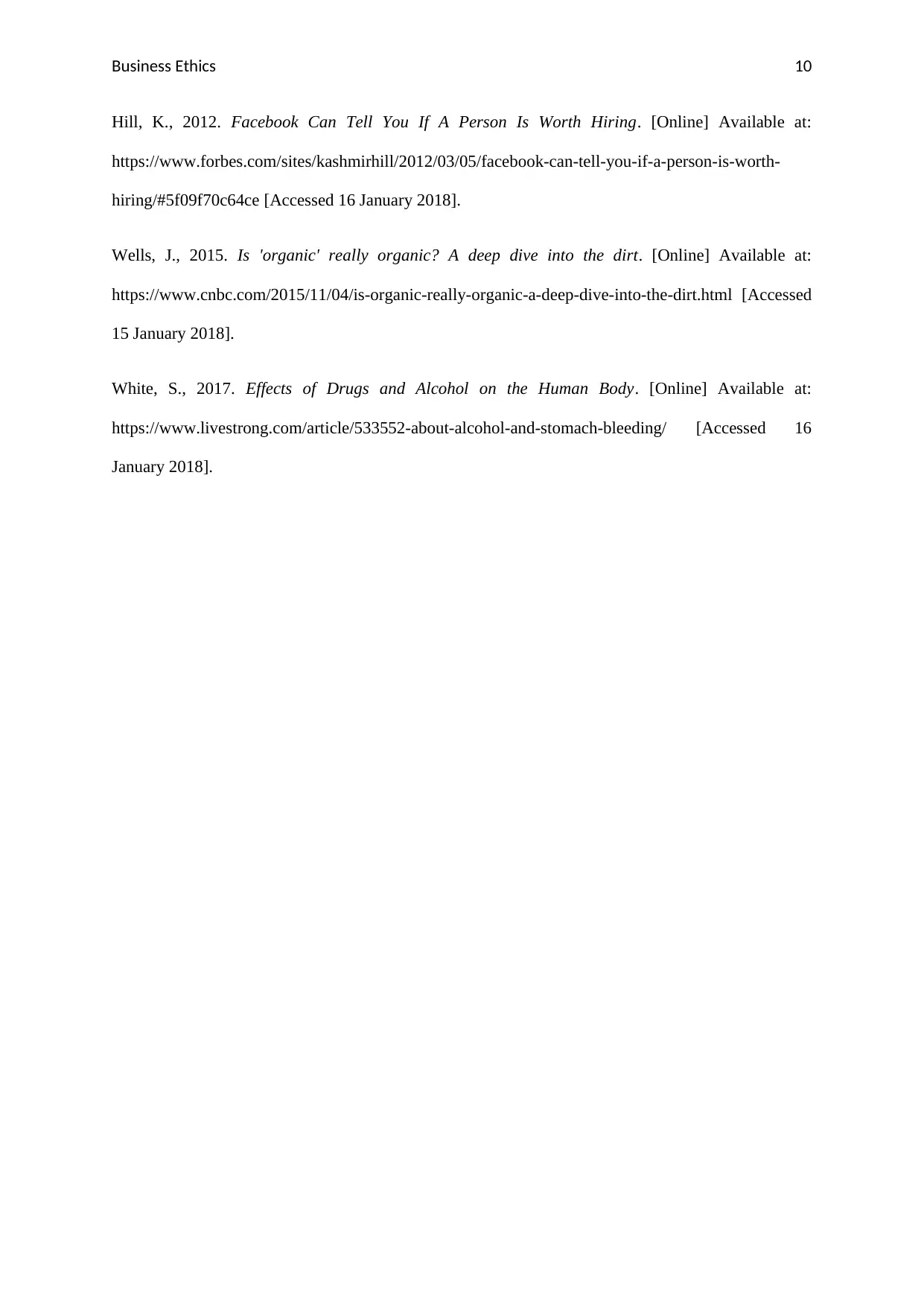
Business Ethics 10
Hill, K., 2012. Facebook Can Tell You If A Person Is Worth Hiring. [Online] Available at:
https://www.forbes.com/sites/kashmirhill/2012/03/05/facebook-can-tell-you-if-a-person-is-worth-
hiring/#5f09f70c64ce [Accessed 16 January 2018].
Wells, J., 2015. Is 'organic' really organic? A deep dive into the dirt. [Online] Available at:
https://www.cnbc.com/2015/11/04/is-organic-really-organic-a-deep-dive-into-the-dirt.html [Accessed
15 January 2018].
White, S., 2017. Effects of Drugs and Alcohol on the Human Body. [Online] Available at:
https://www.livestrong.com/article/533552-about-alcohol-and-stomach-bleeding/ [Accessed 16
January 2018].
Hill, K., 2012. Facebook Can Tell You If A Person Is Worth Hiring. [Online] Available at:
https://www.forbes.com/sites/kashmirhill/2012/03/05/facebook-can-tell-you-if-a-person-is-worth-
hiring/#5f09f70c64ce [Accessed 16 January 2018].
Wells, J., 2015. Is 'organic' really organic? A deep dive into the dirt. [Online] Available at:
https://www.cnbc.com/2015/11/04/is-organic-really-organic-a-deep-dive-into-the-dirt.html [Accessed
15 January 2018].
White, S., 2017. Effects of Drugs and Alcohol on the Human Body. [Online] Available at:
https://www.livestrong.com/article/533552-about-alcohol-and-stomach-bleeding/ [Accessed 16
January 2018].
1 out of 11
Related Documents
Your All-in-One AI-Powered Toolkit for Academic Success.
+13062052269
info@desklib.com
Available 24*7 on WhatsApp / Email
![[object Object]](/_next/static/media/star-bottom.7253800d.svg)
Unlock your academic potential
Copyright © 2020–2026 A2Z Services. All Rights Reserved. Developed and managed by ZUCOL.




